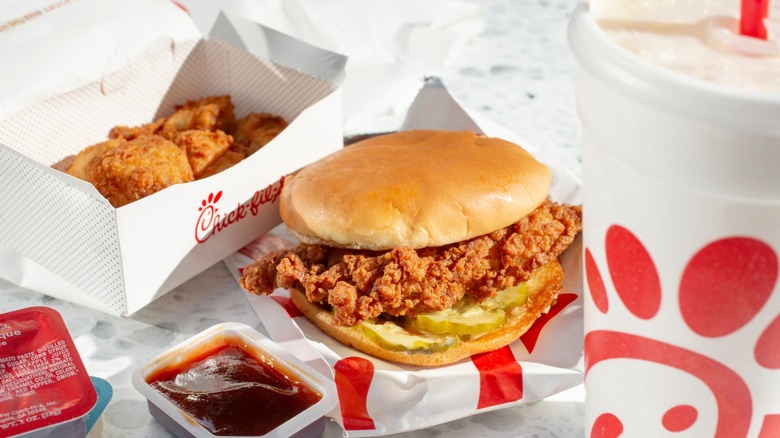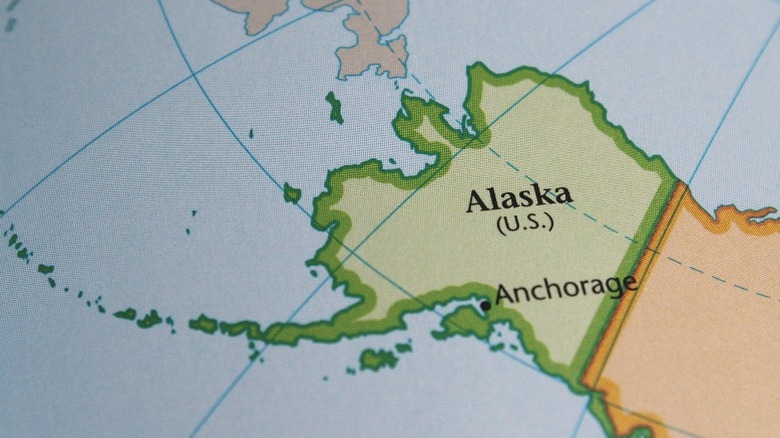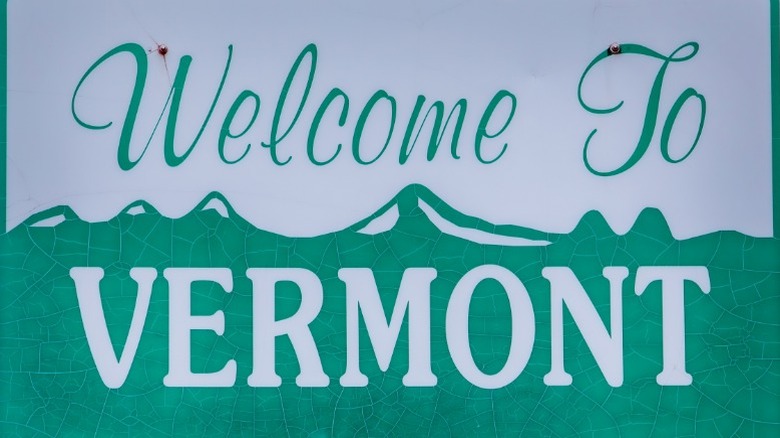The Only 2 US States Without A Single Chick-Fil-A Location
Juicy, golden brown chicken patties on fluffy sandwich buns. Crispy, flavorful nuggets, perfect for dipping in an assortment of savory sauces (as long as they don't eat through their packaging). Hearty waffle fries the size of a toddler's palm. There's a reason Chick-fil-A remains America's most beloved fast food brand, despite some scrutiny over its opinions on the LGBTQ+ community (opinions it has backtracked from in recent years), and the fact that the restaurant seemingly refuses to evenly bread its nuggets. The chain's sheer popularity has allowed it to spread across virtually the entire country – except for two states. Neither Alaska nor Vermont has a single Chick-fil-A location.
Until recently, there were three states without a Chick-fil-A. Hawaii only recently got its first Chick-fil-A in 2022. As of now, there are four locations in the Aloha State. So, why do Alaska and Vermont remain stubbornly Chick-fil-A-less? One is for a reason you might expect — but the other is a little more curious.
Alaska is too remote for a Chick-fil-A
You can probably guess why the North Star State doesn't have a Chick-fil-A. Simply put, it is a food desert. Alaska is cold and mountainous, which makes growing food prohibitively difficult, and its remote location means it's expensive and time-consuming to have goods shipped there. (75% of Alaskan goods go through the Port of Alaska in Anchorage.) As you can imagine, that makes running a Chick-fil-A in Alaska difficult.
As a matter of fact, it's difficult to run just about any fast-food chain in Alaska. All those factors mentioned mean that everything is more expensive in Alaska (heck, every Alaskan citizen gets a yearly stipend from the government), and fast food is no exception. Some fast-food chains in Juneau, the state's capital, have to sell items for at least 30% more money than they would in the contiguous United States. For a company like Chick-fil-A, which obviously seeks to maximize profit wherever it can, the juice likely isn't worth the squeeze.
Chick-fil-A fought Vermont, and Vermont won
So, why can't Chick-fil-A open a location in Vermont? Sure, the state has a famously crunchy granola streak, with its capital city of Montpelier being the only one in the U.S. without a McDonald's (although there's one just outside city limits in Barre), but man cannot live on quinoa and maple syrup alone.
Unfortunately for Chick-fil-A, its brand was tarnished in Vermont by a well-publicized feud between the company and a Montpelier-based artist named Bo Muller-Moore. For the benefit of a local kale farmer, Muller-Moore created a design for a slogan, "Eat More Kale", that ended up on magnets and t-shirts across the state. Chick-fil-A, unamused, asserted that it was too similar to its "Eat Mor Chikin" ad campaign, and hit Muller-Moore with a cease-and-desist in 2011. The entire state of Vermont, up to and including the governor, circled their wagons around Muller-Moore, and, eventually, he patented "Eat More Kale" and won the lawsuit. The damage to Chick-fil-A's brand in the Green Mountain State was done — but not before it introduced a kale salad with maple dressing to its menu, in an act of confusing yet hilarious pettiness.


